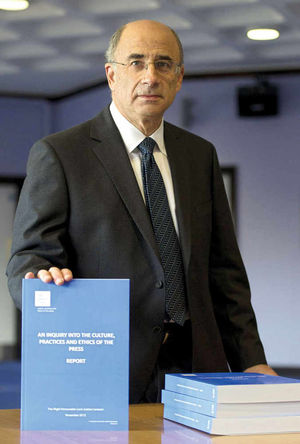Press freedom: Express & Star Editor KEITH HARRISON on why we need YOU to speak up for us now
Section 40 of the Crime and Courts Act 2013. Sounds innocuous enough, doesn't it?

Yet it's not overstating the case to say this pernicious piece of legislation could change the very fabric of our society and bring about a catastrophic end to 300 years of press freedom in this country.
Essentially, if this law is passed newspapers such as the Express & Star face a worrying future, writes Editor KEITH HARRISON.
But before we get into the reasons, let me offer you an insight into my daily working as editor of Britain's biggest-selling regional newspaper.
We publish several hundred stories a day and, while the number is proportionately small, it is not unusual to receive a hand-written letter, angst-strewn email or tearful phone call from someone mightily upset with one of our articles.
In many cases it is a relative (often the mother) of someone who has been convicted in court, demanding to know why we have reported the case, what right have we got and, of course, little Johnny is a saint who is innocent and has been wrongly convicted.At times I have been moved to reply: "But madam, he has 15 previous convictions, is on first name terms with the staff at Featherstone Prison – and he pleaded guilty."
Here's how you help - Click here and scroll down to respond online
You can also e-mail your views to the Editor here
Other recent cases have involved a paedophile caught with several hundred indecent images, bleating about us reporting his conviction because 'only 11' of the pictures were of the worst category. For the record, this despicable specimen also pleaded guilty.
There are other complaints, for which I have great sympathy, that often centre around our reporting of inquests, something any decent newspaper is duty bound to do, but which is naturally fraught with emotion for the people involved.
Given the number of stories we publish, complaints are – thankfully – infrequent.
When we have published something inaccurate, we are at pains to correct the mistake as soon as possible.
But sometimes, complaints arise when we have published nothing but the truth.
After the Leveson Inquiry, the old Press Complaints Commission was wound up and pressure fell on the newspaper industry for tougher regulation.

Most newspapers have joined the Independent Press Standards Organisation, chaired by the vastly-experienced judge, Sir Alan Moses.
It can force newspapers to issue front page apologies and has the power to levy fines of up to £1 million.
However, IPSO – being an independent body – refuses to be overseen by politicians and, as such, politicians don't like it.
They have, however, welcomed a regulator called Impress, which is almost entirely funded by millionaire Max Mosley.
Mr Mosley, you may recall, has had his own issues with the press in the past, involving prostitutes and a sado-masochist orgy (ouch!).
For what it's worth, I have some sympathy for Mr Mosley and believe whatever he gets up to in his spare time is entirely his own business.
He says Impress – which his 'family charity' is supporting to the tune of £3.8 million – is 'completely independent'.
Of course it is. Some may ask 'what could be more independent' than a press regulator endorsing punitive costs on newspapers, overseen by politicians and almost entirely funded by a millionaire with an axe to grind?

I couldn't possibly comment.
Meanwhile, few, if any, of the Leveson recommendations were aimed particularly at local papers. In fact, Lord Leveson praised the regional press for its vital role in our society.
The failings in standards, ethics and procedures at some national newspapers, however, were writ large.
Amid allegations of phone tapping, bribery and corruption the industry turned on itself.
Just a few months after being hailed as the finest in the world after exposing the MPs' expenses scandal, our national newspapers were rounded on as 'the gutter press'.
Friends of mine working in what used to be Fleet Street joked that they pretended to be estate agents at dinner parties rather than confessing to being journalists.
Things had clearly got very bad indeed.
Led by vengeful politicians and a rabble of axe-grinding celebrities, a gallows was erected and now a noose is duly dangled.
That noose is Section 40 of the Crime and Courts Act 2013.
Essentially, this is a piece of legislation that would mean newspapers paying the costs for anyone who wants to sue them – whether they are successful or not.
It would lead to a raft of spurious complaints made by people unhappy with something they have seen in print, who could challenge matters all the way up to the High Court, safe in the knowledge that if they eventually lose the case . . . the newspaper will pay their costs.
Not only is this lunacy, it is dangerous lunacy.
Newspapers' ability to investigate and publish everything from council bosses' expenses to police cover-ups (both of which have featured prominently in the Express & Star this week) would be stripped back for fear of costly legal proceedings, even if the information was entirely accurate and in the public interest.

Anyone with something to hide would know that even the threat of legal action would put doubt in the minds of newspaper editors up and down the land.
As such, Section 40 is akin to someone throwing a brick through your window - then billing you for not only the window, but the brick too.
The nature of newspapers would change forever, public trust in the local press would disintegrate and the economic challenge facing regional publishers would escalate still further.
Public scrutiny would be left to internet tittle-tattle or unsubstantiated social media chatter.
Credible editorial investigations would be taken on by only the bravest of publishers.
In short, it would be a disaster for local democracy.
So what can be done?
A public consultation is now being held and the Government is seeking people's views on press regulation.
Those hell-bent on neutering the nationals make no distinction between the Daily Express & Daily Star and the Express & Star you are currently reading.
In short, we need your help to prevent the Government implementing a law that could put freedom of speech, local democracy and an industry employing thousands of people at risk.
It doesn't take long and is a straightforward process.
This newspaper has proudly spoken up for its readers since humble beginnings in 1874.
Now, we need our readers to speak up for us.





